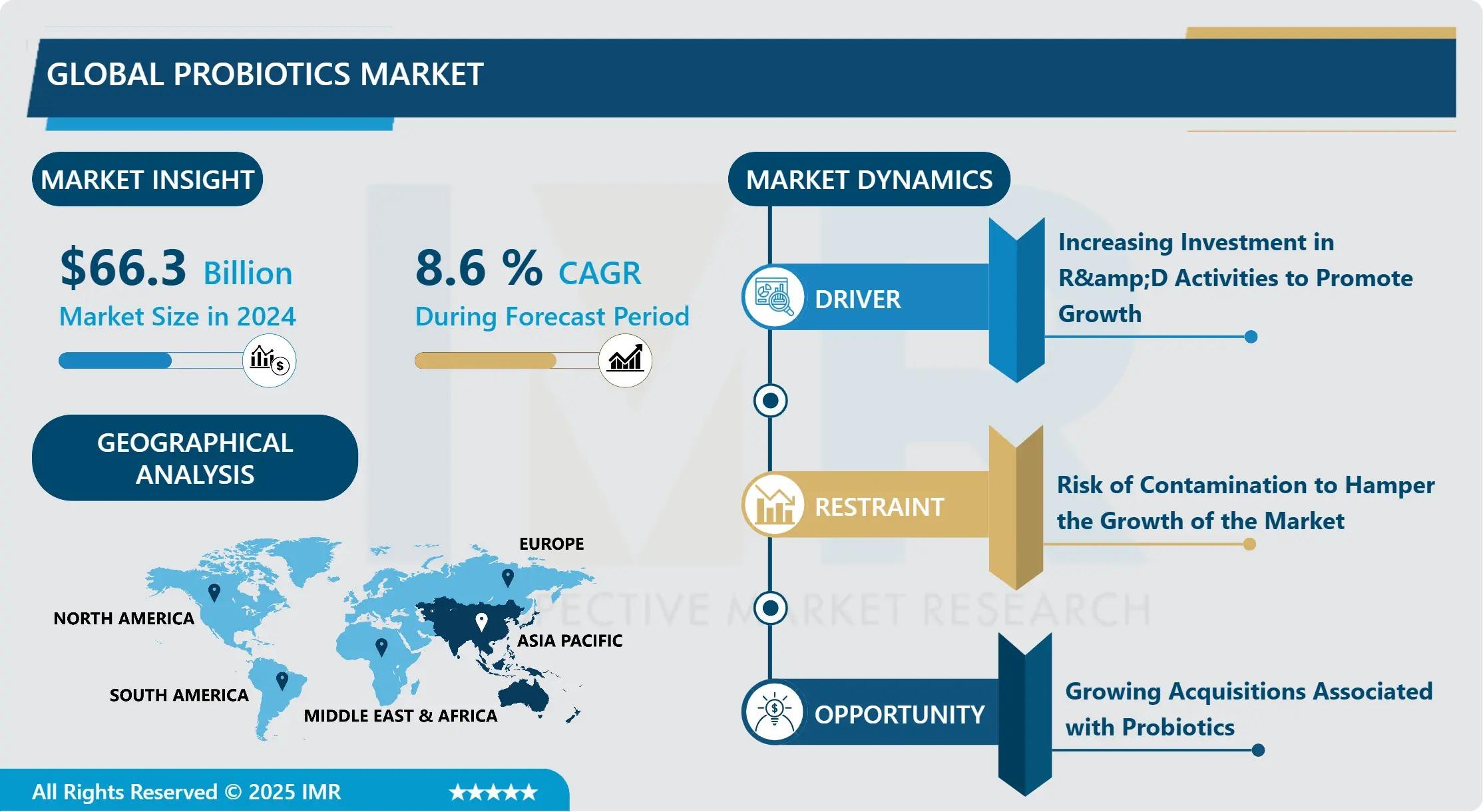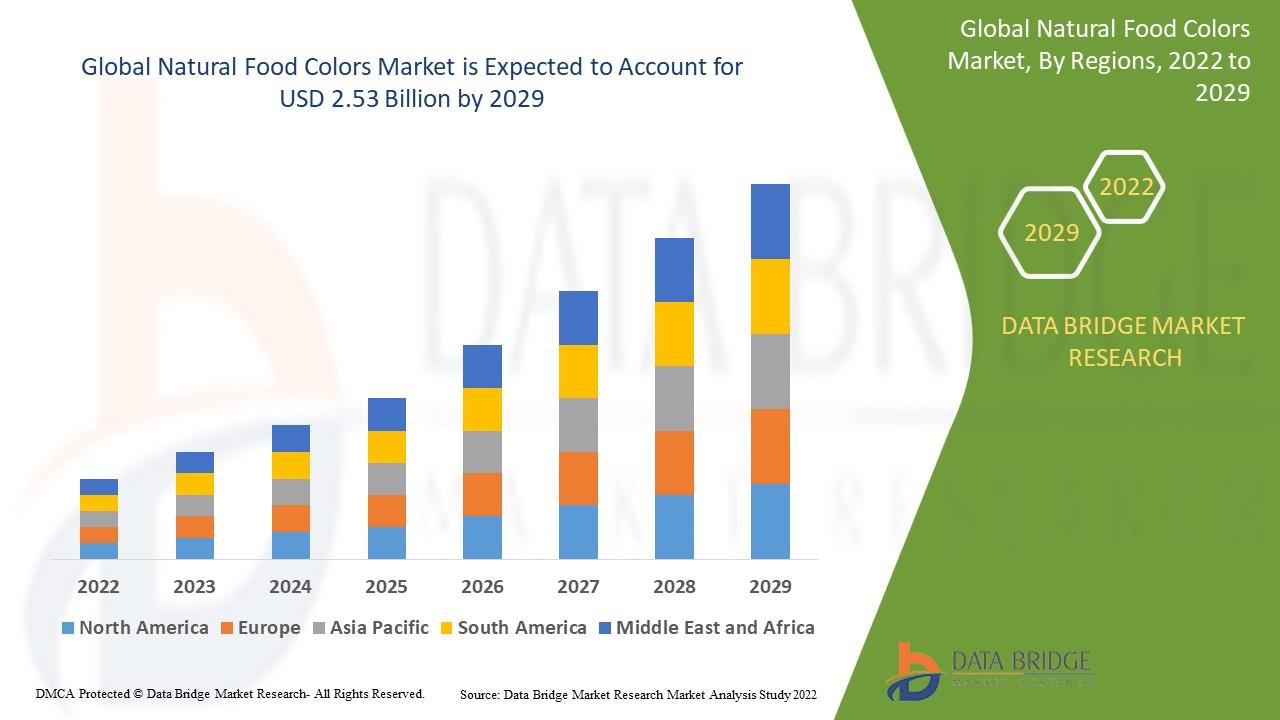Introspective Market Research Sees Global Probiotics Market Doubling to USD 139.3 Billion by 2032

Introspective Market Research (IMR) today released its comprehensive forecast for the global Probiotics Market, projecting a robust growth trajectory through 2032. According to the report, the market was valued at USD 66.3 billion in 2024 and is expected to reach USD 139.3 billion by 2032, registering a compound annual growth rate (CAGR) of ~8.6% over the 2025-2032 period.
This surge is being driven by a confluence of factors: increasing global awareness of gut health and digestive wellness, rising demand for functional foods and dietary supplements, growing penetration of probiotic foods/beverages across retail and online channels, and accelerating interest in preventive health and immune-supportive nutrition — especially in wake of the COVID-19 experience. IMR’s report (Report ID: 15774) provides detailed segmentation by microbial genus, application, distribution channel, and region, offering strategic insights for food & beverage companies, nutraceutical players, and health-oriented manufacturers and investors.
Quick Insights
-
2024 Market Size: USD 66.3 billion
-
2032 Forecast Size: USD 139.3 billion
-
Forecast CAGR (2025–2032): ~ 8.6%
-
Leading Microbial Genus Segments: Lactobacillus, Bifidobacterium, and Yeast-based probiotics.
-
Top Applications: Functional Foods & Beverages, Dietary Supplements, Animal Feed.
-
Key Distribution Channels: Supermarkets/Hypermarkets, Pharmacies & Health Stores, Online Retail, Convenience & Specialty Stores.
-
Prominent Market Players: Danone S.A., Yakult Honsha, Lallemand Inc., Chr. Hansen, Nestlé S.A., DuPont (Danisco A/S), Kerry Inc., Post Holdings, Inc., PepsiCo, Inc., and several active regional players.
What’s Fueling the Market?
IMR’s analysis highlights several key growth drivers:
-
Rising Health Awareness & Preventive Wellness: Consumers increasingly view gut health and immune support as central to overall wellness. Probiotic foods and supplements-historically niche-are now mainstream, bridging dietary wellness and preventive health.
-
Expansion of Functional Foods & Supplements: Growing demand for fortified foods, probiotic-enriched drinks, dairy and non-dairy beverages, and dietary supplements is broadening the applications of probiotics far beyond traditional fermented products.
-
E-commerce & Modern Retail Penetration: The rise of online retail, coupled with growing distribution through supermarkets, pharmacies and convenience stores, is enhancing accessibility, especially in emerging markets.
-
Scientific Validation & Strain Innovation: Advances in probiotic research, better characterization of strains (e.g. Lactobacillus, Bifidobacterium, yeast-based), and improved product formulations are boosting consumer confidence and enabling new product launches.
-
Post-Pandemic Preventive Health Trends: The COVID-19 pandemic has catalyzed a broader interest in immunity, digestive health, and microbiome care — accelerating adoption of probiotics globally.
What Opportunities and Trends Are Emerging?
Could probiotics become a daily staple rather than a niche supplement?
As gut health becomes part of mainstream wellness, demand is shifting from occasional therapeutic use (e.g. after antibiotics or digestive issues) to regular, preventive consumption. This opens up vast potential for daily-use probiotic supplements, subscription-based models, and innovative delivery formats (sachets, gummies, fortified foods).
Is the animal feed segment a hidden growth engine?
Beyond human health, probiotics are making inroads in animal nutrition-driven by growing demand for antibiotic-free, natural growth promoters in livestock and aquaculture. This trend could rapidly expand the addressable market, especially across emerging economies with expanding livestock industries.
Expert Commentary
“The global probiotics market is entering a transformative phase,” said Dr. Neha Rao, Principal Consultant, Introspective Market Research. “No longer limited to yogurts or capsules, probiotics are becoming a core element of everyday wellness — embedded in foods, beverages, supplements, and even animal nutrition. Companies that can combine robust scientific validation, strain innovation, and efficient supply-chain execution are poised to lead this growth. The real winners will be those scaling responsibly, ensuring product quality, and aligning with clean-label, consumer-first trends.”
Regional & Segmentation Analysis
-
Asia-Pacific is expected to be among the fastest-growing regions, driven by rising disposable incomes, increasing health awareness, expanding retail and e-commerce infrastructure, and dietary shifts toward preventive wellness and functional nutrition. (IMR’s report covers markets across China, India, Japan, Southeast Asia, etc.)
-
North America remains a mature and significant market, benefitting from early adoption of dietary supplements, high disposable incomes, and a well-established retail and health-food ecosystem.
-
Europe is also poised for steady growth, supported by rising demand for functional foods, clean-label ingredients, and growing consumer preference for preventive health solutions.
By Microbial Genus:
-
Lactobacillus and Bifidobacterium continue to dominate-supported by extensive clinical and commercial adoption for digestive and immune health.
-
Yeast-based probiotics and novel probiotic strains are gaining attention, particularly for specialized applications (skin health, immunity, functional beverages).
By Application:
-
Functional Foods & Beverages remain the largest segment, driven by fortified dairy, non-dairy drinks, yogurts, fermented foods, and growing interest in gut health through daily diet.
-
Dietary Supplements (capsules, tablets, powders) are growing rapidly, particularly among health-conscious adults, older populations, and consumers seeking convenient gut-health solutions.
-
Animal Feed applications — especially in livestock and aquaculture — are emerging as a promising growth vertical, spurred by demand for natural growth promoters and antibiotic-free feed solutions.
By Distribution Channel:
-
Supermarkets / Hypermarkets and Pharmacies / Health Stores continue to lead, benefiting from wide availability and consumer trust.
-
Online Retail is witnessing strong growth, especially in regions with growing digital penetration — enabling direct-to-consumer access to probiotic products, subscription-based models, and home delivery of supplements and functional foods.
Recent Breakthroughs & Innovations from Key Players
-
Industry leaders like Danone S.A. and Yakult Honsha continue to expand their probiotic portfolios with new fermented drinks, shelf-stable probiotic formulations, and products tailored for gut and immune health — making probiotics more accessible outside traditional dairy-heavy markets.
-
Strain innovation is accelerating: companies are investing in research to develop new probiotic strains with targeted health benefits -such as immunity support, gut-brain axis modulation, women’s health, and skin health-broadening the functional scope beyond digestive wellness.
-
Growth in the animal-feed probiotic segment is gaining traction, as feed manufacturers and livestock producers adopt probiotics to enhance animal health, reduce antibiotic use, and improve yield-opening a parallel growth track alongside human nutrition.
Addressing Cost Pressures & Enhancing Affordability
Despite the optimistic outlook, the probiotics market faces cost-related challenges: raw-material sourcing and supply-chain stability (especially for high-quality microbial strains), regulatory compliance for food and supplement standards, and scaling production without compromising viability of live microbes. IMR identifies several strategies to foster cost-efficient growth:
-
Vertical Integration & Supply-Chain Optimization: Companies investing in in-house strain development, fermentation infrastructure, and raw-material sourcing can reduce costs and improve consistency.
-
Economies of Scale through Volume Production: As demand expands globally-especially in high-growth regions like Asia-Pacific-increased manufacturing volumes can lower per-unit costs, making probiotics more affordable for mass-market consumers.
-
Formulation Innovation: Development of stable, shelf-stable formulations (powders, encapsulated capsules, drinks) reduces wastage, improves shelf life, and enables efficient distribution-lowering overall cost.
-
Digital & Direct-to-Consumer Channels: E-commerce and online subscription models can cut out middlemen, reduce logistics overhead, and offer competitive pricing directly to consumers.
-
Regulatory Compliance & Quality Assurance: Standardizing quality and safety protocols helps build consumer trust, reduces product recalls, and enables premium positioning-which can help offset higher production costs.
Why This Matters
Probiotics are no longer a niche supplement-they are rapidly becoming a cornerstone of preventive nutrition, functional foods, and holistic wellness regimes worldwide. As consumers increasingly seek natural, sustainable, and health-forward options to support digestion, immunity, and overall well-being, probiotics stand at the intersection of health, nutrition, and lifestyle.
For food & beverage manufacturers, nutraceutical players, animal-feed companies, and investors, this represents a powerful growth window. With the right mix of scientific validation, innovation, and supply-chain execution, probiotics can drive long-term value-both commercially and societally-by promoting better health, supporting preventive care, and offering a scalable nutrition solution across geographies.
Download & Connect
To access a free sample of our full Probiotics Market Report — including segment-level forecasts, competitive heat maps, consumer insights, and regulatory analysis — click: [Download Sample]
To request a demo or speak with one of our Principal Consultants, please email us at info@introspectivemarketresearch.com or call: +91-91753-37569.
About Introspective Market Research
Introspective Market Research (IMR) is a global market intelligence firm specializing in biotechnology, nutrition, consumer health, and specialty ingredients. Our in-depth reports, quantitative forecasts, and strategic consulting services empower stakeholders — from startups to multinational corporations — to navigate market dynamics, identify growth opportunities, and make data-driven decisions.
Contact:
Introspective Market Research
Phone: +91-91753-37569
Email: info@introspectivemarketresearch.com



